PDF chapter test TRY NOW
The lesson "The Nose-Jewel" by C. Rajagopalachari shows how greed leads to destruction. The story opens with the narrator introducing the character Ramayya to the readers. Ramayya was a common man who lived in the town with his wife. He had a nice house with tiled roofs. Though he wasn't wealthy, he earned enough to take care of his family.
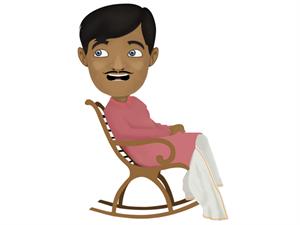
Ramayya was a simple man
Soon, the scene shifts to two sparrows living on the roof of Ramayya's house. They had found a safe and comfortable position in the roof to build a nest, and the mother-bird had laid her eggs in it.
It is interesting to note that the sparrows play a considerably big role in the story. While the story is mostly observed from the point of view of the birds, they also play a larger role in its plot.
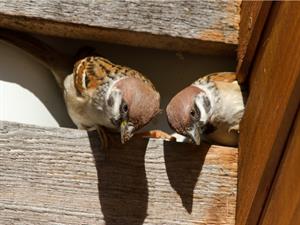
The sparrows can be seen looking down (to observe Ramayya's life)
The male bird began the conversation by exchanging his observation on the relationship between Ramayya and his wife. He said to his wife, 'my dear, why is it that the lady (Ramayya's wife) always fighting with her husband?' The male-bird was feeling bad for Ramayya, and hence, wanted to help him.

The wife always quarrels with Ramayya, says the male bird
However, they are birds, after all. They do not possess enough power to help themselves, let alone a human. Hence, the female bird mocked at her husband and told him that he should focus on what he could or should do. She told him that he shouldn't be bothered about things that did not concern them. Her greatest concern then was to make sure that no cat came near their nest. She wanted to keep her eggs and the young ones safe from predators.
It is quite interesting to note how the readers learn about the quarrel between Ramayya and his wife only through the eyes of the bird. Furthermore, we also see that the relationship between the birds is equally sour, with the male bird calls his wife "self-centred", while the female bird addresses her husband with 'disdain'. It is evident from the way the she-bird responds: she is quite authoritative and doesn't take her husband seriously. On the other hand, the he-bird values his wife's opinion and even calls her 'dear'.
Hence, the male bird may be sympathetic towards Ramayya's situation because he could see himself in the latter's position. Moreover, Ramayya’s situation is expressed only through the eyes of the he-bird. As a result, the credibility of the problem is in question.
After the she-bird disregarded her husband's suggestion that they should help Ramayya, the he-bird looked around and spotted a shining stone lying in the middle of a pile of dirt.
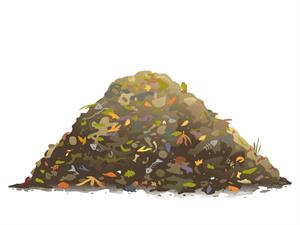
Muck-heap where a shining stud was found
It was a diamond nose jewel. The bird flew to the muck-heap, picked the stud in his beak, and flew back to his wife. He asked his wife whether she liked it.
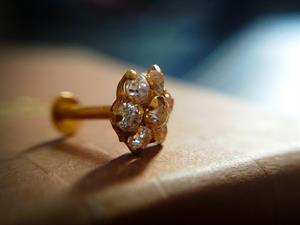
The male sparrow discovered a diamond nose jewel
The wife-bird was obviously unimpressed. Being reasonably practical, she rebuked by saying that it was pretty useless. What was the bird supposed to do with nose-pins or ear-rings? After all, a bird cannot eat them, can they? Neither can it be exchanged for food. Moreover, her baby birds are hungry, and they need food.
So the female bird asked the male bird to bring some worms for their kids. The male bird tossed the diamond stud to the ground and flew off in search of worms.
One could observe that the writer had used wordplay when he used the term 'grub'. Grub is a kind of worm. The word can also mean 'food' in an informal conversation. Interestingly enough, both the words fit into the context. To the birds, worms and food mean the same thing.
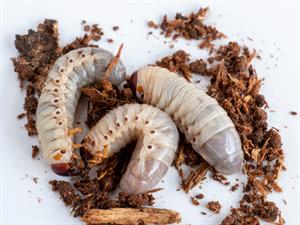
Grubs
When the male sparrow dropped the jewel, it fell on the floor of Ramayya's house. When the lady of the house was doing her routine works, such as cleaning and sweeping, she discovered the diamond stud. She picked it and wore it on her nose happily.
So, do you think it was the right thing to do? No, because it didn't belong to her. Naturally, when her husband noticed the diamond stud on her nose, he was angry and asked her where and how she got that. She explained how she found it lying on their floor the previous day. So she took it and wore it. She wasn't feeling guilty because she believed that she didn't steal it.
Ramayya suggested that they should take the stud and deliver it to the village magistrate. He was worried that the police might come and find it in their house. He told her that it would be very shameful and would bring a bad name to their family. Though Ramayya was not a wealthy man, he was a man of principles. He knew what was right and what was wrong. But the wife failed to heed his advice.
The scene now shifts from Ramayya's house to one of his neighbouring houses. A conversation related to the diamond stud was going on in Meenakshi Ammal's house. Meenakshi Ammal's daughter had lost her nose-jewel recently. She forgot and left her diamond nose-stud in the bathroom.

Meenakshi ammal's daughter was worried as she had lost her diamond nose jewel
Though it was the daughter's fault, we see her blaming Kuppayi, their house-maid. The girl said that since Kuppayi was very careless and ignorant, she must have swept the stud out of the bathroom. The line "I forgot and left it in the bathroom. Kuppayi, the servant woman must have swept it out. She is very careless and ignorant" is important because it shows the mentality and attitude of the rich and powerful. Instead of accepting her mistake, the girl found it easier to blame it on the servant. Being a voiceless and less powerful being, the servant may not even defend herself from accusations and prying.
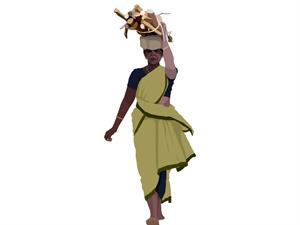
Kuppayi, the servant maid
So, coming back to the story, we see Meenakshi Ammal consoling her daughter. She told the girl that they would search and find it but warned her not to tell Father as he would get furious.
Unfortunately, while the mother and the daughter were having the muffled conversation, the father entered. Ramanathan, the father, enquired about the secret conversation they were having.
Having caught in the middle of the act, they had no choice but to confess about the loss of the diamond nose-stud. The story about the lost jewel spread quickly around the village. Everyone suspected that Kuppayi had stolen it. As a result, the police came and searched Kuppayi's hut. As expected, they found nothing in her hut.

Police searched Kuppayi's hut but found nothing
As said earlier, we see how the powerless are easily targeted in society. It was easy to frame or suspect Kuppayi because she was poor and vulnerable. She cannot stand up against her masters and wouldn't dare to voice out her injustice. Hence, she is an easy target.
When the police started checking around, Ramayya became very scared and nervous. His heart was in a flutter; he didn't know what to do and was worried how things would turn out when the police search their house.
Ramayya's wife was equally scared. It was too late for them to bring the jewel to the magistrate or return it to its owner. So the wife did what she could do: she hid the stud away in her box. She was so scared and worried that she soon developed a severe fever. Soon enough, she became bedridden. It could be because of the fear of catching the fever or the reputation of Ramayya, but either way, nobody searched their house. And no one learned about the little diamond jewel tucked away in the box.
The happenings at the house were observed by the two sparrows living in the roof. Once again, the he-bird began the conversation. He was enjoying how the events had turned out and asked his wife to look at the fun happening at Ramayya's house; Ramayya's wife was scared and had fallen ill.
The she-sparrow was sympathetic towards the woman's situation. She couldn't consider the suffering of the others as entertainment and also was worried that the fever might end up killing Ramayya's wife. Though the she-sparrow seemed self-centred in the earlier scene, we understand that she is a practical and sensitive bird. Unlike the male sparrow, she was not cruel. For, we hear the male sparrow say that the death of Ramayya's wife would be a good thing.

The she-bird is worried that the fever might end up killing Ramayya's wife
The she-sparrow cited her husband for being the reason for the sufferings of Ramayya and his wife. She said that the he-sparrow tempted Ramayya's wife by throwing the diamond on their floor. If the bird hadn't dropped the stud, the wife would neither have picked it up nor would the couple be in that state.
The male sparrow responded thoughtfully. The sparrow defended himself by saying that he didn't ask Ramayya's wife to steal. She was suffering not because that the male-sparrow had dropped the jewel, but rather because of her greed, said the male sparrow.
The female sparrow understood the words of wisdom. She agreed that her husband was right and said that they shouldn't be greedy. People should not have desires for things that did not belong to them. The female bird then suggested that they should go out and look for food for the young ones. Soon, they flew off.
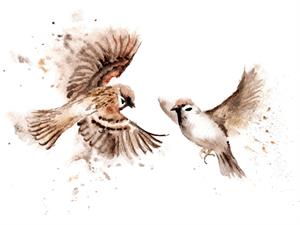
The birds flew off
The story ends with the narrator concluding how Ramayya and his wife spend the rest of their lives. Though they were never caught, they lived in fear of being caught. Even though the diamond Nose- Jewel was still with them, they were worried that they would be discovered and lose their respect in front of society. Moreover, the fear had probably prevented Ramayya's wife from wearing the stud. Hence, the fear of getting caught was several times more than the happiness that the stud had delivered.
Therefore, the greedy was punished sufficiently. As Lau Tzu, an ancient Chinese philosopher had said, "there is no calamity greater than lavish desires. There is no greater guilt than discontentment. And there is no greater disaster than greed".
